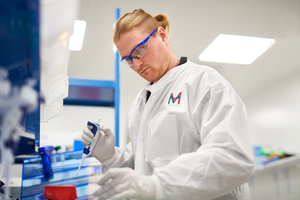Q4: Pfizer lauds 'big bet' in ADC space
Pfizer crowns ADCs as the "hottest thing" in M&A and reinforces its expectation to reach $10 billion in sales by 2030 following its acquisition of Seagen.
January 31, 2024

After weeks of speculation, Pfizer agreed to acquire antibody-drug conjugate (ADC) developer Seagen for $43 billion in March 2023. The deal closed nine months later and saw Pfizer add a pipeline of ADCs and four approved therapies to its portfolio.
At the time of closing, Pfizer predicted Seagen’s products would bring $10 billion in additional revenues by 2030. During its Q4 2023 financial call, Albert Bourla, CEO of Pfizer described the deal as a “big bet […] in this technology” and told shareholders “a few things […] have reinforced our confidence in this number.”
“[…] ADCs became the hottest thing on the M&A activity. Everybody wants an ADC, [and] basically our big bet was in this technology. So, it looks like there is an overall consensus among investors, companies, [and] analysts that this is a technology that will deliver a lot.”
There has been aggressive M&A activity in the ADC space over recent years. AbbVie bought ImmunoGen for $10 billion in December 2023, and Eli Lilly agreed to buy preclinical ADC firm Mablink Bioscience in September last year.
This month, Johnson & Johnson announced it is set to acquire ADC developer Ambrx Biopharma in an all-cash transaction worth $2 billion.
Oncology operations
Bourla said its pipeline in oncology is “among the strongest in our therapeutic areas” and that the acquisition of Seagen acted as “a critical step toward our goal to achieve world-class Oncology leadership.” The firm reiterated it feels “very good” about the $10 billion and predicted its 2024 financial guide to range between $58.5 billion to $61.5 billion, which includes $3.1 billion in anticipated revenues from Seagen.
“Seagen's in-line medicines are expected to immediately enhance Pfizer's top-line growth, and our combined portfolio provides the opportunity to lead genitourinary cancers and be a leader in breast cancer and deliver at least eight potential blockbuster products by 2030,” said Bourla.
On the same day of closing its Seagen deal, Pfizer further bolstered its ADC pipeline through a licensing agreement with Nona Biosciences. Nona received $53 million upfront, with the potential for up to a further $1.05 billion upon development and commercial milestones in exchange for the global clinical development and commercialization rights of MSLN-targeted ADC, HBM9033, which aims to treat various solid tumours including breast, mesothelioma, lung, ovary, and pancreatic cancers.
“Pfizer’s industry-leading Oncology portfolio now includes over 25 approved medicines and biosimilars across more than 40 indications, including nine medicines that are either blockbuster or have the potential to be blockbuster,” the firm reported.
Overall financials
While Pfizer seems positive 2024 will bring financial gain to the company, its 2023 results were hit by a decline in COVID-19 product sales.
For the full-year, Pfizer reported $58.5 billion in revenue, a decrease of 42% year-on-year. The company made $14.2 billion in revenue during the fourth quarter of 2023, a decrease of $10 billion, or 41% compared to the year prior. The firm cited the decline of its COVID-19 products (Paxlovid and Comirnaty) as the driver.
In October 2023, the firm introduced a $3.5 billion cost realignment effort. Following this, news outlets reported Pfizer is shuttering its Peapack, New Jersey plant and two facilities in North Carolina. Additionally, in November 2023, the company said approximately 200 jobs at its sterile injectable facility in Kalamazoo, Michigan and 100 jobs at its single dose plant in Newbridge plant in Kildare, Ireland will be lost.
However, despite the clear cut back in COVID-19 operations and a spokesperson citing at the time the firm anticipated “further changes through this wider realignment program,” Pfizer remained optimistic it would “see overall growth in our manufacturing operations through 2024.”
Part of its optimism is driven by its decision to add 230 roles at its Grange Castle, Dublin and Ringaskiddy, Cork sites in Ireland, but no further specifics were not disclosed.
You May Also Like





